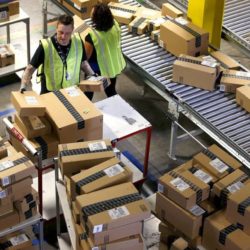AlixPartners annual poll says more than half of e-commerce consumers now browse by which shipping choices are available
The survey results underscore the big and growing role that shipping holds in the competition for e-commerce.
PHOTO: ROSS D. FRANKLIN/ASSOCIATED PRESS
LORETTA CHAO
June 13, 2016 4:51 p.m. ET
Online shoppers who are already pushing retailers to give more for less are about to get even more demanding, a new survey shows.
In its latest survey of over 1,000 U.S. consumers, supply chain consulting firm AlixPartners LLP found that consumers expect to wait an average of 4.8 days for delivery, down from 5.5 days in 2012. And the share of those who are willing to wait more than five days has declined to 60% from 74% in four years.
Although more than half of those surveyed have never used same-day shipping, a growing number say offers of free shipping “greatly” impact their ordering decisions. Over half of shoppers said they browse products online based on the available shipping methods, the survey said.
The survey results underscore the big and growing role that shipping holds in the competition for e-commerce, a factor that is pressuring margins for retailers as they cope with the high cost of delivering goods to homes in a timely manner. Consumers increasingly make their buying decisions based on convenience when shopping across more categories—pushing retailers to upgrade their supply chains and delivery networks to accommodate the changing demands.
The greater delivery expectations is “a reaction to what the market leaders in retail are putting out there…obviously in the e-commerce space, Amazon and Wal-Mart are influential to consumers,” said Marc Iampieri, director of AlixPartners’ supply chain practice.
“Customers say, ‘I like that, I want that.’ And now everyone has to offer it,” he said.
But delivering products individually to many consumers’ homes, instead of in batches to retail stores, drives logistics costs up for store operators even as consumers demand to pay less for better service.
And while managing deliveries is more complex and difficult to do profitably, the survey shows deliveries will physically become more difficult as well. Hard-to-deliver items such as home improvement goods and furnishings are about to see an increase in demand from online shoppers over the next year.
A quarter of respondents said they had purchased home furnishings for home delivery in the last 12 months, and 30% said they would make such purchases in the coming year. This is a bigger increase than more-established online retail segments like apparel and books, which more consumers buy online but which aren’t growing as quickly.
Oversize items often need special handling and take up more space on trucks, making them more expensive to handle. United Parcel Service Inc. and FedEx Corp. have both raised prices for such bulky items, which don’t easily move through their distribution centers, while other carriers such as XPO Logistics Inc. and Schneider National have invested in “white glove” services to help retailers deliver, and even install, oversize items.
Delivery of groceries, pet supplies, auto parts and cleaning supplies were among the least likely categories to be ordered for delivery, the survey said, with 70% of respondents having no plan to use grocery delivery services.
Write to Loretta Chao at [email protected]


Comments are closed